This article was written by Portland resident and transportation advocate Andrew Lindstrom. This is a slightly edited version of the post that appeared earlier this week in the City Hikes blog.
The Portland Bureau of Transportation is preparing for this year’s Sunday Parkways — open streets events that were modeled after the “ciclovía” program (bike lane in Spanish) in Bogotá, Colombia. But although the events in Portland and Bogotá both happen on Sundays and involve the city shutting down certain streets to car traffic to make way for people on other modes, the similarities stop there.
Each Sunday in Bogotá, for the entire year, the city closes 75+ miles of streets for the ciclovía. In Portland, on the other hand, PBOT has recently downsized the program from five annual Sunday Parkways to just three. Throughout the three events in Portland this summer, the city will manage to close a total of 11.5 miles. Additionally, the kinds of streets that are part of these programs are very different. In Bogotá, the city opens up major city corridors to people outside of motor vehicles whereas Portland tends to focus the program on smaller neighborhood streets. In other words, the Portland events end up being pretty weak tea compared to the strong Bogotá brew.
But Sunday Parkways are still the marquee “carfree” event in the city of Portland, so I think they’re worth a closer look.
Portland Sunday Parkways is the Taco Bell of ciclovía programs.
Can a carfree event be transformative? In Bogotá, there is plenty of evidence that the ciclovía program has transformed the city: over one million people participate in it weekly! In Bogotá, major streets get closed and people flock to them. It’s impossible not to notice. In Portland, I wouldn’t even know they existed if I weren’t a transportation dork – and while perhaps the longer-tenured Portlanders feel otherwise, it feels like Sunday Parkways hasn’t really gotten the love it needs to thrive as an event. And considering that one event last year featured an angry man brandishing a gun, it’s safe to say there’s a ways to go Sunday Parkways has a transformative effect for the culture of roadway space in Portland.
The streets Bogotá shuts down for the ciclovía aren’t minor ones. Calle 26 is partially grade separated, and connects the central city to the airport. (A Portland equivalent would be something like 82nd Ave.) And that is exactly why it’s a great program. It gives the most important streets back to the people, once a week. In typical USA fashion, we have appropriated something really cool from Latin America and made it mediocre. Portland Sunday Parkways is the Taco Bell of ciclovía programs.

The goal of a ciclovía-style event is to give street space back to the public. If only a few miles of streets (none of them major) are shut to motor vehicles, is it even worth comparing Portland’s Sunday Parkways to Bogotá’s?
What’s the big deal?
The big deal is that Sunday Parkways’ goals are unclear, and I even think the events subtly reinforce car culture because they happen so infrequently. When PBOT is unwilling or unable to run the event more than three times a year, and when it happens only on neighborhood streets, it sends the message that cyclists (and pedestrians) don’t belong on major roads.
PBOT’s latest emphasis on Sunday Parkways as a way to “provide free, accessible, inclusive family-friendly activities in underserved communities” doesn’t make sense in the context of Bogotá-style ciclovía events, which are large enough to encompass the entire city (including previously-underserved neighborhoods). The event in Bogotá also has a static route that has been roughly the same since the 1970s. It’s confusing for everyone to change the streets that are part of the route, both motorists and participants. If Portland’s Sunday Parkways event covered more ground in the city, everyone could benefit, including people in underserved communities.
I’d also like to see PBOT focus more on the benefits of Sunday Parkways as a way to give back space in the streets to people biking and walking, but that goal seems like an afterthought. When cyclists, pedestrians, and non-automobile users are given space on the roads, it normalizes the idea that streets are for everyone and that they are a public space. We have the excellent Pedalpalooza rides to look forward to, but if PBOT got their act together we could have a truly transformative official event rather than something that simply pays lip service like our present program does.
What I would do
I’d like to propose a Bogotá-style plan, with static closures every Sunday during a specific time, on major or semi-major thoroughfares that are typically functionally closed to cyclists. Here’s a potential map for what it could look like:
It’s not a perfect map, and in a lot of ways it’s not as “radical” as Bogotá. But it would be a good place to start. SE Stark in particular is a street I would really love to see closed for a cycling event. It’s got it all – a mostly flat alignment (outside Mount Tabor), a good amount of smaller commercial areas (around 14th, 28th, and east of Tabor), and it’s also one the most dangerous streets in the city for pedestrians and cyclists east of I-205). There are also plenty of parallel streets that people can use if they want to avoid the event.
But the specific streets that close are less important to me than consistency and frequency. And it needs to happen weekly, year-round, rain or shine. Frankly, when we plan cycling events only in the summer, it reinforces the need for a car. Rain is a fact of life in Portland from October to May – if cycling is to be a fact of life as well, then cycling in the rain needs to be part of that.
We can have nice things too, but it takes a lot of work to get things done. Realistically, all we have to do in Portland to get a real ciclovía event is have visionary leadership and ample public pressure. Maybe don’t hold your breath on this, but you can start by attending the Sunday Parkway events that we do have and demanding more from your public officials. Ride your bike, take the bus, go on walks. If you want your city to be a better place, I think the first place to start is to engage with the city as a human being.



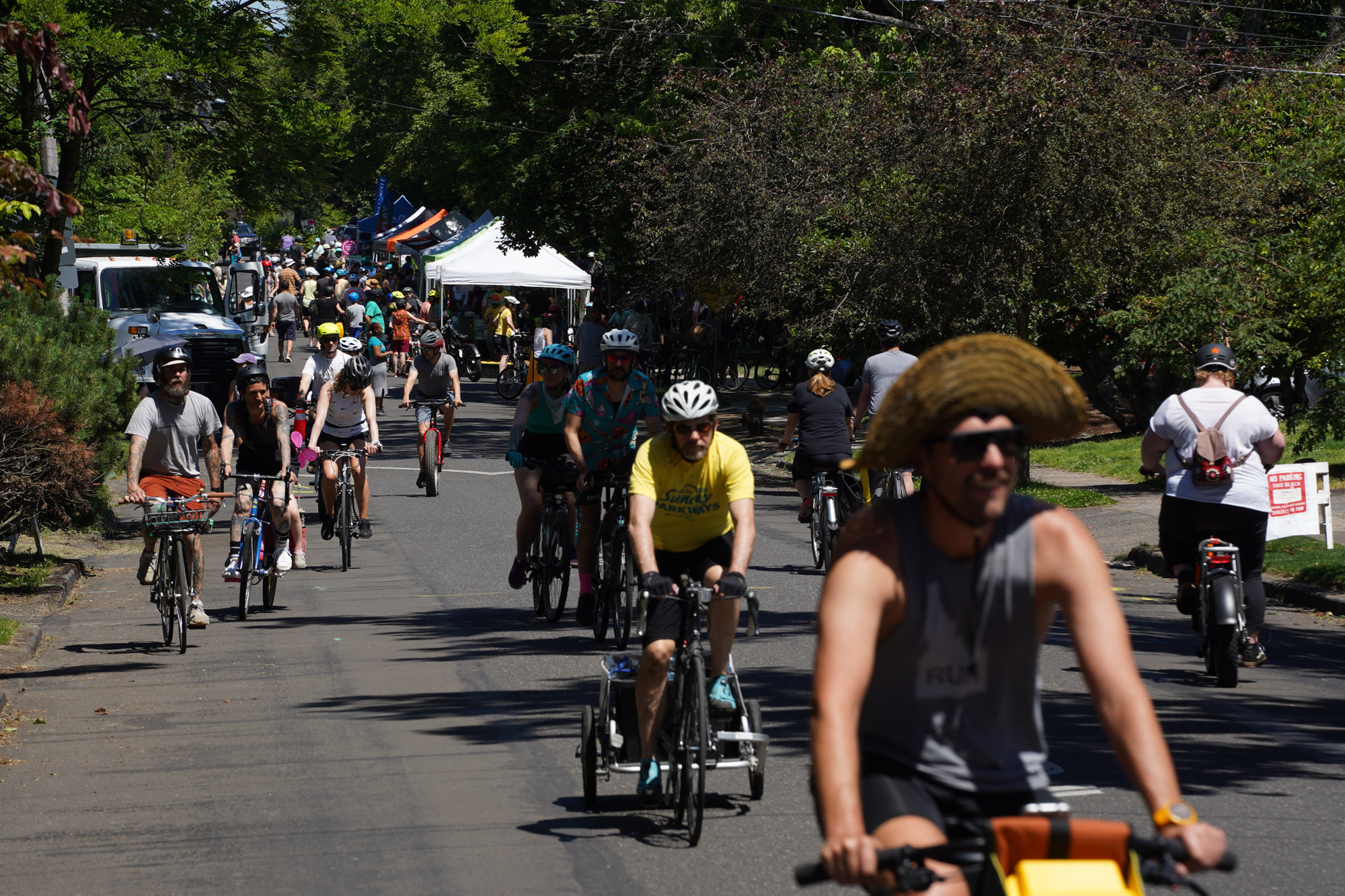
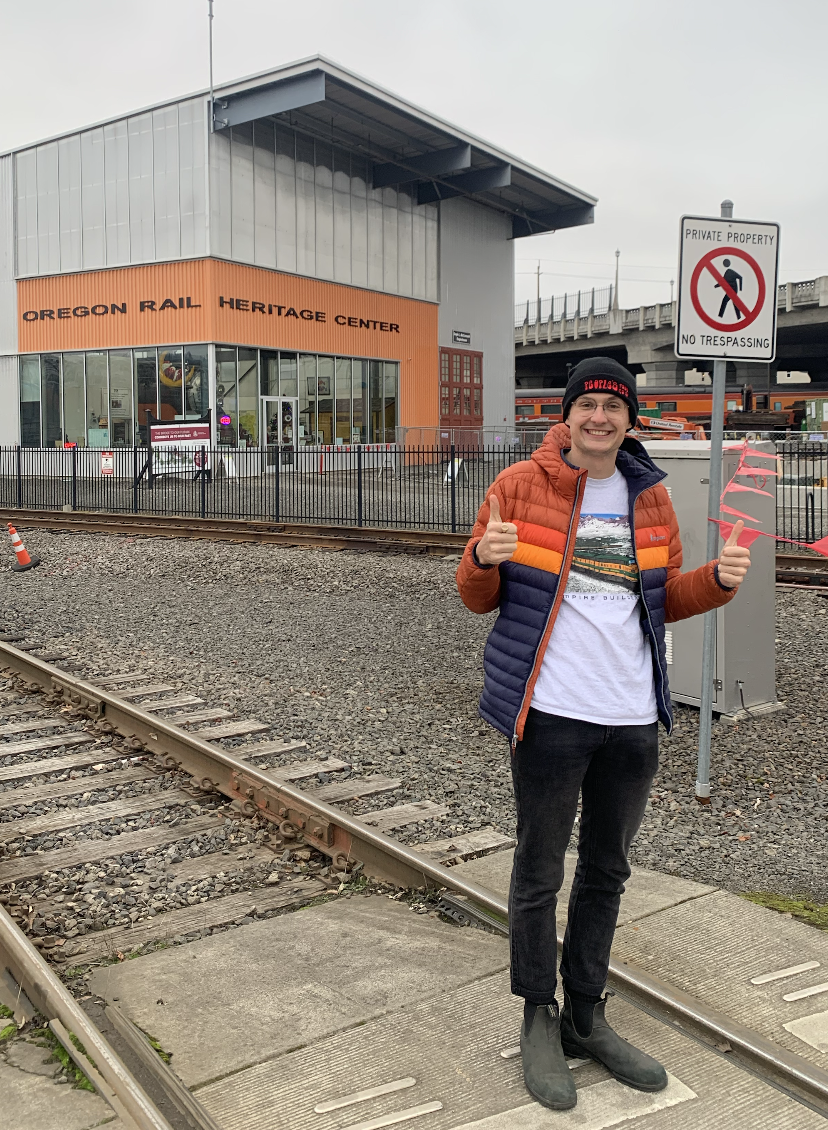

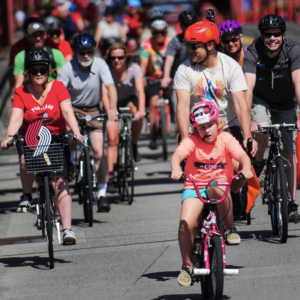
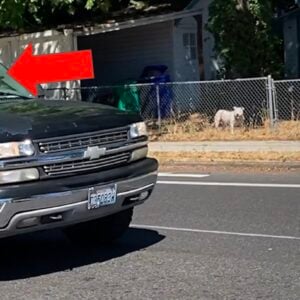
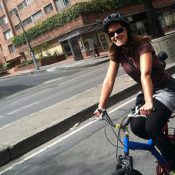
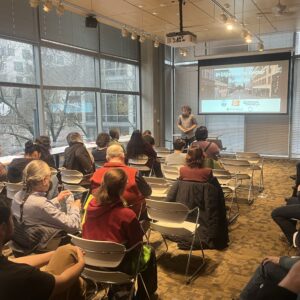
Thanks for reading.
BikePortland has served this community with independent community journalism since 2005. We rely on subscriptions from readers like you to survive. Your financial support is vital in keeping this valuable resource alive and well.
Please subscribe today to strengthen and expand our work.
I enjoy Sunday Parkways — especially in areas I wouldn’t commonly ride to or through — but I couldn’t agree more with Andrew’s point that they can “subtly reinforce car culture” due to their sparsity and neighborhood-streets routes.
They don’t normalize bike riding; instead they treat it like a trifle, a confined concession, with an underlying “know your place” vibe that doesn’t begin to shift our city’s consciousness towards reaching the Bicycle Plan’s goal of a minimum of 25% of all trips by Portlanders by bicycle.
If they’re not going to add bike lanes to a major road like Hawthorne, they should at least include Hawthorne on a Sunday Parkways.
Thanks Matthew. Yeah I find it so frustrating to engage with topics like this – I feel like a part of me always is saying “oh just be thankful for what you have”. But the long term effects of trivializing biking and walking on streets to a “three times a summer only” event really bother me.
I’d really love for a Sunday Parkways event on Hawthorne as well. It would make for a really excellent day of lingering in a place that I like – but always feel rushed by too many people on far too small of sidewalks.
I can already hear the howls from the Hawthorne “business community” at any mention of a possibility that Hawthorne could be closed to cars one day (or morning) of the year. Imagine the economic losses! Scandalous.
I love the idea of having some more major streets closed down for Sunday parkways. It would be lovely to bike down Hawthorne to visit coffee shops, restaurants, and thrift stores without having to deal with angry drivers.
My only sticking point is what is the plan for transit? Many of the corridors proposed have frequent and well-used bus lines. Reroutes of those bus lines would cause a lot of disruption and delay for transit users. Let just the buses through? In my experience, Trimet operators are very conscious and courteous of people on bikes, but many first-time or occasional riders – “interested but concerned” – might be put off by having to share the street with buses.
Ever ride behind a bus in its exhaust plume? Neither fun nor healthy. Let’s talk when TriMet decides it’s finally time to go electric.
Trimet would be much smarter to use CNG (compressed natural gas), which would deliver 90% of the energy directly to the drivetrain, unlike the fossil fuel to electricity conversion which provides only 40-50%.
But Trimet won’t use CNG b/c it looks bad – not “green” enough. So they harm the environment more in order to appear green.
You might want to check the growing body of research on fugitive methane emissions of natural gas from wells, pipelines, and processing facilities. I think it’s highly debatable whether natural gas is less harmful to the environment than diesel fuel is.
True, but I’d rather be riding in the plume of a CNG powered bus than a diesel one.
I can’t imagine how they could look less green than keeping their old diesel buses around.
It’s true: they’d rather run old diesel than clean CNG. I heard someone say, “It’s all about the optics.” That’s really what’s happening with electrification now – good in theory but still dirty as hell if the electricity is coming from dirty sources, and also really inefficient, which hurts this engineer’s heart.
Even if you electricity is 100% coal (and that won’t be true anywhere for long if it is even today), you’re better of with electric vehicles. They’re just that much more efficient.
And the pollution is concentrated in one spot. And the entire fleet will get better as the electric grid gets updated.
There’s really no justification for continuing with diesel, especially if you are a public agency. [snarky comment about TriMet deleted]
Nooooope, that’s just a big expensive investment in continued fossil fuel dependence. We don’t need it.
That’s part of why SE Stark is an appealing candidate – it’s a commercial street without bus service, or with an easy reroute available (up to Burnside once the 20 runs on it). I don’t really see an issue with rerouting a few buses to parallel routes in the name of a good ciclovia. Which might make Hawthorne a bit tricky I guess.
I think reroutes are fine honestly. Maybe putting the entire route of the 14 was a bit aspirational, but a reroute on the 72 to avoid Alberta would be easy. And while it would be a lot to close all of W Burnside (3 bus routes cross the bridge), I think there is a lot of value in closing the highest profile streets for a car free event. And I don’t know if I mentioned it, but in Bogota the cicolvia isn’t an all day event – I believe it goes from around 10 am to 2 pm. So the reroutes wouldn’t even be an all day thing on Sunday.
There’s a bit of precedent for reroutes on some of these corridors for yearly parades/street fairs. We already deal with altered transit service on Sundays vs other days of the week; if there was a good reason (like this!) and a good plan for a re-route, it could be managed.
I like this idea. If we really wanted to effect change, we’d make the whole city car free on specific days. Brussels completely banned all car use within the city on September 18 last year (transit still ran). Compliance was very high, and public opinion was strongly supportive.
Do you think the public in Portland would be strongly supportive of doing something similar here?
I’m sure it would be mixed. Undoubtedly there would be a vocal minority that would complain about the war on cars and against personal freedom, or some BS.
It wouldn’t be a vocal minority – it would be a vocal MAJORity. Look no further than the last Sunday Parkways event in SW Portland, right before it was canceled. I would not have believed the level of bellyaching from drivers, if I hadn’t witnessed it myself.
Brussels did not ban cars within the entire city. It was in the historic Old Town of inner Brussel comprised mostly of small scale, partly pedestrian streets with beautiful historic buildings.
Sunday Parkways used a good bit of downtown in 2018 and The Oregon estimated 15,000 people showed up.
I loved taking my kids when they were young. Once they got over 10 there just didn’t seem like there was a point. Those events were isanely popular for many years, Did it move the needle? maybe, but in the end it is a huge pain for the City t put on and requires sufficient volunteers.
https://www.brussels.be/car-free-sunday
https://www.brusselstimes.com/283926/car-free-sunday-brussels-to-be-largest-car-free-zone-in-europe
No, it was the whole city (as well as regional territory located outside of city limits).
Brussels is in the process of permanently banning cars in the old city every day of the year. But car free Sunday was the whole city for one day.
It really frustrates me when people try to ‘correct’ me with falsehoods.
I’ve always been disappointed that Sunday Parkways has avoided going through Portland’s business districts (the one exception being one year that went through the Multnomah Village center).
What a missed opportunity to celebrate these areas and demonstrate that cyclists and pedestrians are great customers!
Sunday Parkways went through downtown in 2018.
https://www.oregonlive.com/news/erry-2018/07/aa84b50f2c8537/sunday-parkways-brings-the-fun.html
“We can have nice things too”….I wish that were the case in Portland. We have *had* nice things like our once wonderful multi-use paths for example, but decided to hand those over to bad actors engaging in anti-social behavior.
C’mon, Frank – we’re talking about Sunday Parkways here, not the MUPs.
Get out there on the Springwater (west of 82nd) and I think you’ll see it’s a bit better. (Trying to find a silver lining!)
Sorry, Andrew, but cycling in Portland is seen as frivolous, while driving a car or truck is de facto important and “good for business.” City officials know better than to mess with the status quo.
I laughed when I read
since you reminded me that most Portlanders find out about Sunday Parkways when they can’t drive to Starbucks for their Sunday latte and feel mightily inconvenienced and pissed off.
You are right that it would be waaaaaay better to “close” some major roads (close them to cars) every Sunday for an entire summer, to train drivers to avoid that route – similar to the way SW Capitol Hwy between Taylors Ferry and Garden Home has been closed (southbound) for the past two years. But it’s just never gonna happen in Portland – our leaders simply don’t have the chutzpah to make it happen. Maybe when there is a public groundswell, they’ll have no choice. But until then, the anger we saw from the frustrated truck driver from Vancouver is just a heightened version of the same emotion other drivers are feeling.
I agree with the sentiment that walking and biking is seen as, at best, political exhibitionism, and at worst, a burden to those poor, oppressed SUV drivers just trying to make an honest living.
Can we convince business owners to buy in on it? Seems like “business owner” and “homeowner” are the only titles that really matter to politicians. I have met a few folks who run business in my neighborhood who are very pro-pedestrian/bike. I remember Jonathan interviewed the guy who owns Dot’s Cafe about the (now permanent!) removal of cars from Clinton at 26th.
It’s good to borrow ideas from other cities, but comparing Portland to national capitals is a bit of a regular far-fetched farce on BP. Portland is the most important and by far the largest commercial city in Oregon, an otherwise minor and unimportant state on the west coast of the USA – but it’s not even the state capital.
Portland is not Bogota nor anything like it, a city of 8 million (13 million metro) with a year-round mild climate and 12-hour days, as it is high altitude yet close to the equator – it is policed by a branch of the army, something we would never tolerate anywhere for long in the US – and of course it is the country’s national capital.
Portland ain’t Amsterdam nor Copenhagen, neither in age nor in importance; nor are we Paris – there’s only one Paris though there’s lots of imitations.
In my opinion, Bogota’s Ciclovia program was originally set up as part of 2009 city-wide program to fight rampant crime, to get citizens to participate in building community, to get more “eyes on the street”, as the national police were simply overwhelmed by both petty and violent crime – and the government continues to put huge resources into it because crime rates have in fact fallen. It turns out that getting your citizens involved in their community is a proven crime-fighting technique – who knew?
During the summer of 2020 did not Portland traffic effectively shut down? So shouldn’t it be possible for the city to do the same thing again, declare a public health emergency, force the “house arrest” of nearly it’s entire city population for health reasons, then merge it’s local police, county sheriff & deputies, the FBI, the state police, the national guard, and the US army into one single cohesive police unit, to enforce a carless Sunday every week?
I mean surely Portland is less economically important for the US than Bogota is for Colombia – it should be easier to do an event like this in a sleepy little town of 600,000 than a bustling metropolis of 8 million.
And Bogotá’s ciclovia program is old – it started in 1974. It certainly did not start in 2009 to stamp out crime.
I’m not gonna touch the other stuff man. I didn’t live here in 2020, and I’m not sure what point you’re trying to make with all this anyways. I’m simply saying they have a good car-free street event in Bogota, and that Portland should at least try to emulate it.
“It should be easier to do an event like this in a sleepy little town of 600,000 than a bustling metropolis of 8 million?”
Not if the population strongly supports it in one place and strongly opposes it in the other.
Not every idea that works in one place translates well to every other place.
Do you think that the population of Bogota simply woke up in 1974 and decided – “yes, let’s close a bunch of major streets so people can ride around on their bikes?”. It was a stark change of pace (especially for urban Colombia) and a revolutionary idea. Granted, cycling culture in Colombia has a long history and continues to be very important nowadays – but the point is more that large scale events take guts and often go against popular opinion at first.
Portland will never reach it’s goals in active transportation if it refuses to push against certain cultural norms. And I don’t really see evidence that a “true” ciclovia would be “strongly opposed” by Portlanders anyways. In my experience, open street programs are almost always very popular – even in the US. In my hometown, the most popular car-free space in the city (State Street, Madison WI) used to be a regular street. It is now the most popular commercial street in the city and hasn’t had cars since the 70s. I guarantee Portlanders in 2023 are more willing for car-free experiments than Madisonians were in the 70s.
Look at programs like Last Thursday on Alberta, or even annual street fairs (Belmont has a good one, I know many other commercial districts do too). They are incredibly popular. But they have a disjointed schedule and they aren’t frequent enough. In my opinion, a benefit of a ciclovia is formalizing and streamlining a variety of events that are popular already around the city.
Sure, not every idea translates well – but the ciclovia is an example of something that tons of US cities are already trying to do. Here is the list of US cities that have/have had a ciclovia event – but almost none of them have anything resembling a year-round widespread event. City officials want to do this stuff – but don’t want to actually put in the work to make it good, or transformative.
Ah yes, Madcity, the state capital AND the main university – Salem and Eugene in one city. And how is Milwaukee? Has it gone car-free yet?
So let’s use State Street in Madison as an example. In the years since the 70s, in the last 50 years, has any other “major” street in Madison gone car-free for any significant amount of time?
Milwaukee is an awesome city, I’ll take no Milwaukee slander. They may not be car free but they do have the Bronze Fonz.
I promise being the seat of the state government of Wisconsin offers Madison no benefit when it comes to active transportation. It’s almost certainly a detriment actually.
Have any other streets gone car free since State? No. But that doesn’t really matter? I’m using it as an example of a good car free street.
There is only so hard elected officials can push beyond what their constituents want before they get turfed out. And that’s how it should be.
It’s going to get harder now that we have charter reform, because rather than convincing one leader to take a risk, you’ll need to convince seven.
Portland was never going to meet its active transportation goals, and it feels like PBOT has given up trying.
But… that’s ok with me. I still think Portland is a great place to ride, and the thing that would most make it better would be to crack down on the 5% of drivers who are crazy dangerous. That’s something most residents would support.
A lot of People here can’t enjoy riding bicycles without proselytizing…. If 5% rode regularly it would be nice. 25% is just a stupid number that will never happen.
It used to be that if the city just gave us bike lanes we would all ride….then they made greenways which are great but it didn’t raise the bar.
‘Now, if they just gave everyone an e-bike that would surely do the trick…
I am more than happy to have what infrastructure we have to myself, if it doesn’t get everyone else on bikes, I could care less.
I don’t disagree there. It’s massively disappointing to see PBOT capitulating on every goal the city has set. Portland is a pretty good place to ride, I just wish it were even better.
***Moderator: Deleted first paragraph and a couple more sentences. Personal attack. Debate the idea.*** You are not suggesting something new for Portland. Portland has been there and done that. The City is now struggling to emerge from post-COVID, Post-Riots, Post-homeless crisis and things are not as they were right now. But even with all that, if PBOT can muster a few Sunday Parkways this summer, I think that is awesome and a good sign and should be celebrated, not criticized for not being more that what it was always meant to be
And you are thinking that what you are “simply saying” is new?
From the PBOT website:
“Every Sunday in Bogotá, Colombia, the city briefly transforms. Miles of roads are free of automobile traffic, allowing residents to bike, walk or roller-skate across the city unimpeded. Inspired by Bogotá’s weekly event, Portland’s Sunday Parkways began in 2008, closing streets to cars and opening them to people.”
Nothing you have said here is new. ***Moderator: Deleted sentence. Don’t get personal. *** For twelve years Portland had one of the most successful car-free street events in the country and very well may have them again. Right now, due to a multitude of issues, cannot muster the full Sunday Parkways, and that is fine with me.
The Portland Sunday Parkways event falls short of the Bogota ciclovia, and we should be dreaming a little bigger. That’s the whole point – PBOT hasn’t really delivered a transformative event. And car free events can make cities much better, if they are done well
Well drump seemed to think Portland was the center of the universe for the last part of his horrible presidency since that was all he would talk about, so…
I like the sound of this proposal. The consistency and frequency part does sound key.
And the thing about the rain “from October to May” that I think people don’t fully understand until they ride year round (at least I didn’t) is that it may rain many of the days in that range, but it isn’t actually raining all day every day. You can look at the 10 day forecast and it says rain every day but what that means in reality is that it might rain for an hour or two total each of those days and chances are good you’ll miss it when you go out (although plan for it anyway).
I know what will work to get this event throughout the city..
E-bike Sunday parkway!
That seems to be the go-to fix for all things biking in Portland in 2023….
Yo why are you salty about e-bikes? What’s the deal? My ebike has almost completely replaced my car.
I have nothing against e-bikes, glad you use yours. They are not a Panacea obviously as bike use in the city has gone down.
People Replace cars with regular bikes, they don’t ask someone to pay for their regular bike.
If you have one and use it, good for you.
Keep them close in. Put them on major streets with lots of businesses that will benefit from the heavy and bike foot traffic. Keep it the same routes every year with only slight adjustments as needed. Make them happen more often. Enforce no auto access.
*****Get ppb to arrest drivers who pull guns on the volunteers*****
https://www.wweek.com/news/courts/2022/08/26/a-bystander-called-police-after-driver-raged-through-east-portland-he-never-heard-back/
The closest approximation of a cyclovia in Portland, geographically, is the Bridge Pedal. The exceptional quality is that it’s not free. The second best would be the Naked Ride, except for clothes. The Naked Ride I put second only because conflicting motor vehicle traffic has to be controlled at every intersection.
I’d be perfectly pleased to institute Andrew’s idea except for the traffic control. If anyone is using motor vehicles in town you need parallel routes and also crossings at a separate grade. That means taking over the freeways. In the spirit of a cyclovia you can’t stop the people and let cars through.
I don’t understand how this article was considered worth printing. You have an educated and savvy audience base. Please do some homework and research costs and implementation challenges. How did Bogotá’s program start? What were those first street closures like? How much does it cost the city? Provide some real suggestions for PBOT. Is there any mention here about PBOTs ongoing budget crises that is only getting worse? No. I’m sorry but this is fluff and I expect better from BP.
Thank you for writing, Sarah. I understand where you are coming from. I found myself in a similar mindset about 10 minutes ago.
I still have a spot on my NA’s transportation committee. Recently, a new, younger, enthusiastic person has joined. She’s got a real fire in her.
And she’s made project list! … LOL, lol, lol … lol. LOL. Lol
The background is that Portland Heights, within the past couple of years, has had several SWIM projects built. We did quite well, and the designs are great, wow. I’ll be resting on my laurels for having been involved in a small way until I die.
Much of the new person’s list consists of projects that have been discussed and hashed out for years. I can tell her exactly why none of it is doable: improvements to Dosch and the area around St. Thomas More require bioswales, that involves BES — too expensive to be competitive; PBOT does not like mid-block crosswalks connecting intersecting trails, there is only one I know of in SW; more frequent service for the 51 bus — lol, lol, lol — that’s the problem that pulled me into transpo world several years ago.
But why in the world would I want to discourage this person? It’s a good list, I just got too tired to do it. I can steer her toward the lower-hanging fruit, buy her a beer, giver her some tips.
Jonathan is out this week, and I can’t speak for him. But I do know that he values a diversity of voices, and especially from new, younger, energetic people. Good luck to them.
Valid point. I appreciate enthusiasm as well but I’m also tired of empty criticism that can’t be bothered to be backed up by the smallest amount of research. I can also try to appreciate new enthusiastic voices. 😉
“ tired of empty criticism”
I hear you, you’re talking to the comment moderator, I read 30,000 comments last year, a few of them directed at me.
(Before I get myself in trouble, I think we have an exceptional and improving comment section.)
Mingus Mapps asked us to shovel our sidewalks—out I go.
Thanks for the feedback. The Bogota ciclovia was started by a man named Jamie Ortiz Mariño in the early 1970s, with the first event being in 1974 – here is an interview that VeloNews did with him a few years back. In the interview, he talks about how the program built upon an existing cycling culture in Colombia but that urban/transportation cycling wasn’t a huge part of that. Cost-wise, the best estimate I could find was that it cost ~10 cents/user and there were around 1.7 million users on the average week. Which works out to ~$170,000/week, so in the neighborhood of $9 million/year. Here is the Vox article I read while writing this piece if you are interested in the societal cost/benefit of an open street event.
PBOT’s budgetary crisis is (largely) a result of bad governmental structure so fixing that would be a place to start. Things like ODOT taking 50% of the gas tax revenue state wide, bad cooperation between city bureau’s especially in terms of revenue sharing, a lack of non-parking meter related discretionary funds aren’t really directly related to Sunday Parkways though. I didn’t feel that it was worthwhile to dive into the minutia of cost and the state of the city in an article that is about highlighting why I think Sunday Parkways hasn’t been transformative and what changes would make it better reflect its original inspiration.
What does it cost to do the annual Bridge Pedal event?
I believe that part of transitioning to having a better transportation culture is having last-mile options. Though lots of the people who came to the events biked there, most of the booths people came by car. The city itself had vans and trucks all around. This paints this event as a fun thing to do on a Saturday, like skiing, camping or going on a boat. Nothing to do at all with carfree culture at all, IMHO.
That’s because it is just a fun thing to do on a Sunday… A fun thing to do with kids.
It has NOTHING to do with transportation. Either does the Bridge pedal. 20,000 people did the bridge pedal in its heyday, about 10 rode to work the next day.
They are just fun cultural events, no more, no less.
I don’t understand why it is so important to people to keep urging other people to ride bikes for transportation.
Just do it if if it works for you. I rode from NE Portland to Beaverton for work for years. 24 miles a day. It was a great way to commute and I wish more did but preaching to other people never makes a difference.
Its not “infrastructure” either, mainly people are kind of lazy, it rains, a whole lot of reasons why people don’t bike.
More people rode bikes back when this was an actual bike riding website instead of a e-bike transportation blog.
This site used to make bike riding seem fun instead of making bike riding
appear to be so much drudgery, you need a motor…
There’s the small issue of climate change, perhaps you heard of it. Together, all of us need to make changes in our lives to try to mitigate the harm that car infrastructure is causing to our lives, not to mention endangering our future. It is one of the many privileges that we have in wealthy countries, at the expense of poor people around the world, wild animals, natural habitats and the future of humanity if there is any.
I do my part, I can’t force others and neither can you.
What is your point?
To force people to ride bikes?
We could have bike only streets all
Over town and they won’t be used in the rain, in the cold, in the dark.
You are preaching to the choir.
I’ve been in the rain and the dark outside of a car. I’ve been in the rain and the dark inside of a car trying to see past the lights flaring on the water droplets on the windows just in case there were any bikes around. Both were pretty sketchy, inside the car was actually worse.
I do not completely take your point that a bike street constructed on sound principles would not be used in the rain, in the cold, in the dark.
If you live in America, you are the problem as far as climate change.
Poor people around the world consume as much in a month as you do in a day, so if your point is that wealthy countries are going to fix the problem, good luck with that.
Gasoline goes over 5 bucks and the American people are ready to impeach the President.
Oh heck. I know Amit a little. He lives in America but he also makes a bunch of interesting choices. “…you are the problem…” is over the top. There’s an idea that one person can’t save the planet but if every damn American did as Amit does it would bounce the needle pretty hard.